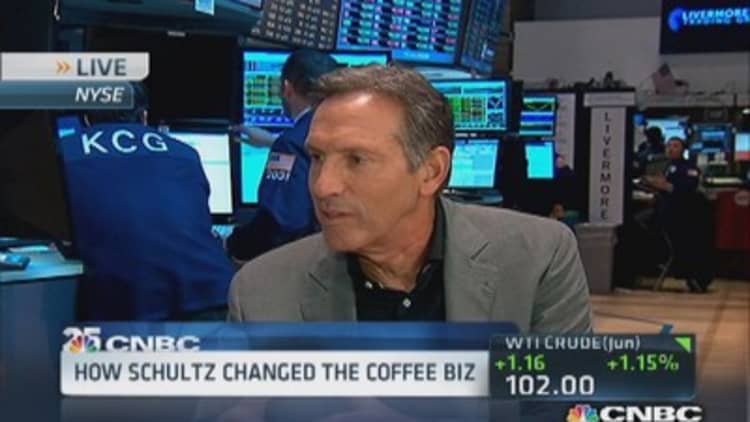
Starbucks CEO Howard Schultz has plenty of options to choose from when planning his global company's next focus for growth—coffee, tea, mobile payments? The answer might surprise people, Schultz told CNBC on Tuesday.
"Starbucks is still the core business and I think the growth vehicle for the company," Schultz said on "Squawk on the Street." "People will be surprised how many stores we're going to be able to open."
Schultz was named No. 14 on CNBC's First 25 list, a compilation of men and women who left the largest impression on business and finance since CNBC first aired in 1989. The Brooklyn native made Starbucks a massive global brand similar to McDonald's, creating a $15 billion market for specialty coffee just in the U.S. The coffee company's rapid expansion made Schultz a billionaire.
More on CNBC 25:
US doesn't have a rational tax policy: Welch, No. 12
Buffett: This is hugefor mom & pop investors
HP's Meg Whitman: This was my big blunder at eBay
The last 25 years: What's changed, who mattered...
How we chose the names
The List
Starbucks now runs 19,000 stores in 60 countries, and Schultz plans a big push into the tea market. In a recent CNBC interview, Schultz valued the global tea market at $90 billion. On Tuesday, the day Starbucks' Teavana tea shops began selling chai tea under the Oprah Winfrey brand, Schultz said he plans to open 1,000 tea stores.
The longtime Starbucks CEO stepped down from the company in 2000 only to return in 2008, when competition from rivals picked up and the Great Recession cut down on latte spending. Starbucks' share prices suffered deep declines before Schultz returned to his company.
"In 2008 the whole world was against us, and we said we're going to show up and we're going to show up every day," Schultz said.
I carry the scars of being that poor kid and the fear of failure.Starbucks' Howard Schultz
Schultz said he takes his business personally, whether it's expanding Starbucks' flagship stores into Vietnam or making worker satisfaction a priority. Schultz acknowledged that his biography was well-tread territory—his poor childhood growing up in housing projects—but it's a big part of his management strategy, he said.
"Candidly, I carry the scars of being that poor kid and the fear of failure," Schultz said. "That's what drove me all these years. I tried to build the kind of company my father never got to work for. ... Success is best when it's shared."
What started as a provincial and then national phenomena is now a global brand, and Schultz said his iconic green coffee shops perhaps do a better job of promoting American culture than politicians. For example, Starbucks has opened stores across Vietnam, an American war-zone more than 50 years ago,
"People are looking for American products," Schultz said. "There is a halo still on America. Businesses can carry that flag."
As Starbucks sets its sights on worldwide domination of the the tea market, the company also wants to become the leader in mobile payments. During an recent interview with CNBC, Schultz said his coffee shops treat digital Starbucks "stars" as currency and allow customers to pay with smartphone apps.
Companies risk failure without a social media and mobile strategy to complement brick-and-mortar locations, he said
"There's no consumer brand on the planet today that can endure and succeed unless it is being integrated seamlessly with mobile and social strategy," Schultz said. "We are leading in mobile today, but that lead is not something we're entitled to. We have to constantly re-invest. We're going to build a mobile business that we think will be quite significant in the future."





